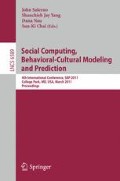Abstract
As systems science methodologies have begun to emerge as a set of innovative approaches to address complex problems in behavioral, social science, and public health research, some apparent conflicts with traditional statistical methodologies for public health have arisen. Computational modeling is an approach set in context that integrates diverse sources of data to test the plausibility of working hypotheses and to elicit novel ones. Statistical models are reductionist approaches geared towards proving the null hypothesis. While these two approaches may seem contrary to each other, we propose that they are in fact complementary and can be used jointly to advance solutions to complex problems. Outputs from statistical models can be fed into computational models, and outputs from computational models can lead to further empirical data collection and statistical models. Together, this presents an iterative process that refines the models and contributes to a greater understanding of the problem and its potential solutions. The purpose of this panel is to foster communication and understanding between statistical and computational modelers. Our goal is to shed light on the differences between the approaches and convey what kinds of research inquiries each one is best for addressing and how they can serve complementary (and synergistic) roles in the research process, to mutual benefit. For each approach the panel will cover the relevant “assumptions” and how the differences in what is assumed can foster misunderstandings. The interpretations of the results from each approach will be compared and contrasted and the limitations for each approach will be delineated. We will use illustrative examples from CompMod, the Comparative Modeling Network for Childhood Obesity Policy. The panel will also incorporate interactive discussions with the audience on the issues raised here.
Access this chapter
Tax calculation will be finalised at checkout
Purchases are for personal use only
Author information
Authors and Affiliations
Editor information
Editors and Affiliations
Rights and permissions
Copyright information
© 2011 Springer-Verlag Berlin Heidelberg
About this paper
Cite this paper
Mabry, P.L., Hammond, R., Ip, E.HS., Huang, T.TK. (2011). Computational and Statistical Models: A Comparison for Policy Modeling of Childhood Obesity. In: Salerno, J., Yang, S.J., Nau, D., Chai, SK. (eds) Social Computing, Behavioral-Cultural Modeling and Prediction. SBP 2011. Lecture Notes in Computer Science, vol 6589. Springer, Berlin, Heidelberg. https://doi.org/10.1007/978-3-642-19656-0_14
Download citation
DOI: https://doi.org/10.1007/978-3-642-19656-0_14
Publisher Name: Springer, Berlin, Heidelberg
Print ISBN: 978-3-642-19655-3
Online ISBN: 978-3-642-19656-0
eBook Packages: Computer ScienceComputer Science (R0)

